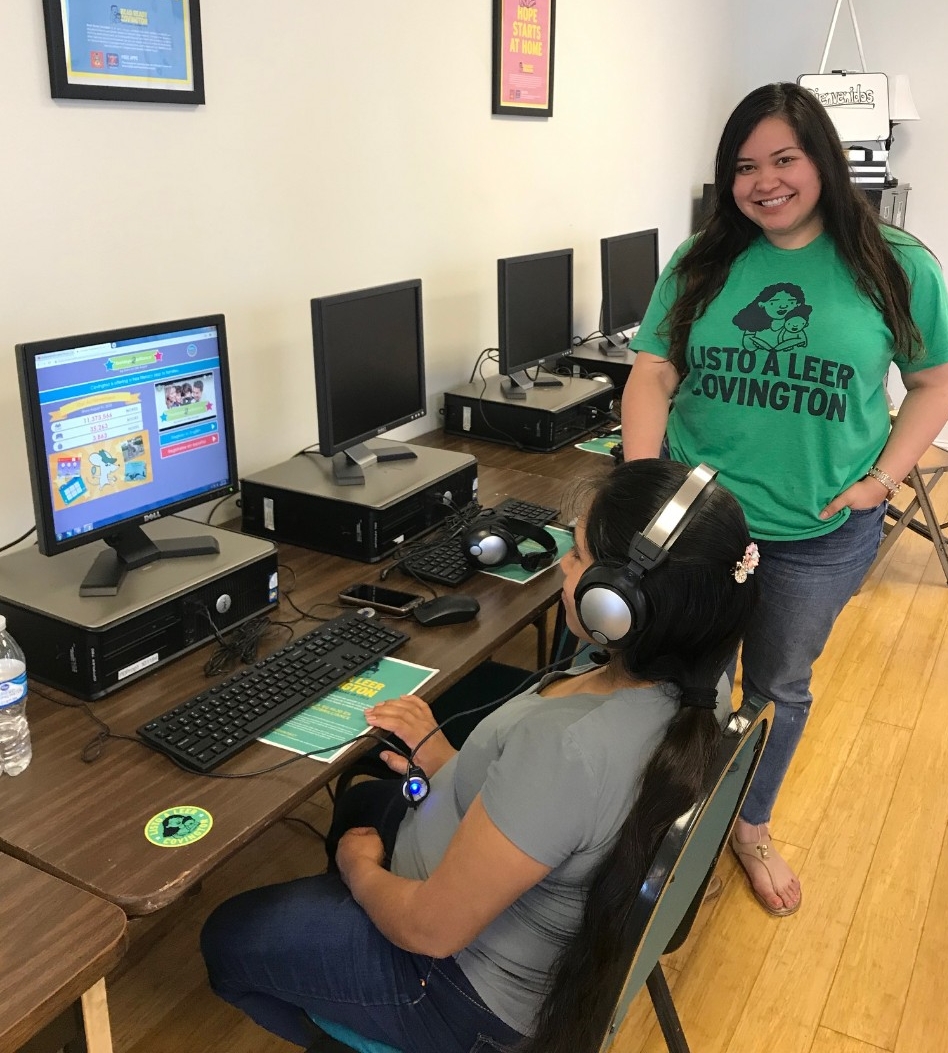
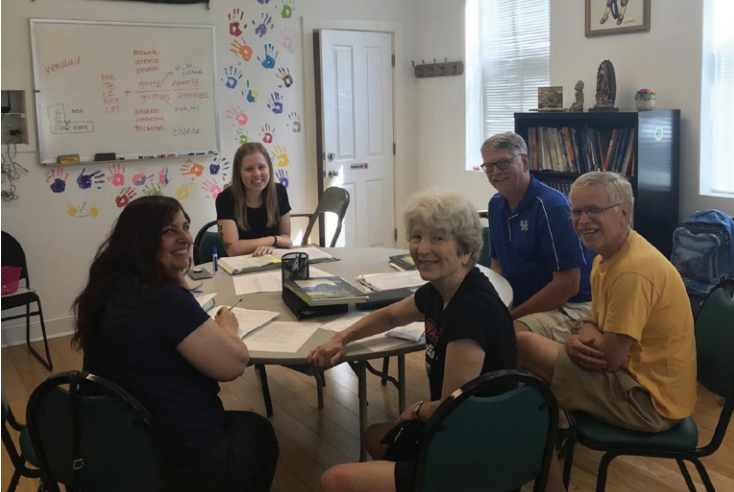
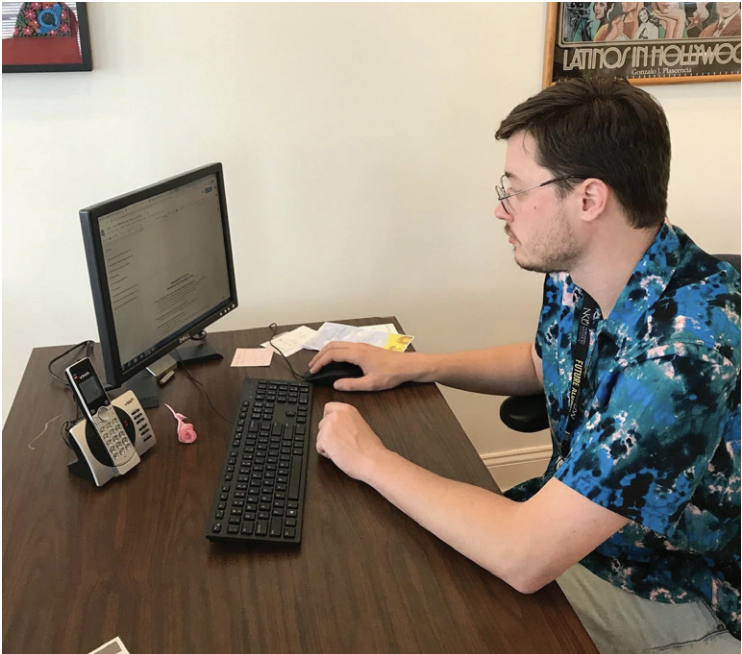
We also now have professions-oriented micro-credentials available in French, German, Japanese and Spanish for current and former students, as well as community members. Micro-credentials demonstrate mastery of relevant workplace skills, abilities and competencies. NKU micro-credentials may be displayed on online platforms— including LinkedIn, Twitter and Facebook pages—as well as on résumés. Follow the links below to learn more (scroll down on the page to view the details of each language’s micro-credential):
Abstract:
JR’s Artivism: Giving a Face to the Immigrant Experience
Throughout the ages, people have crossed borders in search of better life opportunities. The twentieth and twenty-first centuries have witnessed unprecedented mass migrations. More often than not, the immigrant has been viewed as the “other,” the alien, the unknown and the “threatening.” In 1886, France gave the U.S. the Statue of Liberty, the work of French sculptor Frédéric-Auguste Bartholdi and structural engineer Alexandre-Gustave Eiffel. Over time, the statue became a symbol of hope, opportunity and hospitality to generations of immigrants. Some 130 years later, another French artist, the 2011 TED prize recipient JR, revisited the history of Ellis Island, resurrecting the immigrant experience by pasting outsize archival photographs of immigrants on the walls of the abandoned Ellis Island Hospital. The topic of immigration has been at the heart of JR’s work, whether it is documenting the hardships of migration, empowering DACA dreamers to give a face to their struggle, or constructing a scaffolding at the border wall between the Mexican city of Tecate and California, showing the smiling face of Kikito, a toddler peering over the fence separating the two countries. His monumental black-and-white photographic installations affirm the very existence of the migrant who is often ignored and relegated to invisibility and force us to confront our biases and fears of the “stranger.” My presentation explores how JR’s art invites us to encounter the migrants, bringing them out of the shadows of history, housing projects, or border walls, and start conversations on our shared humanity.
Abstract:
Gisèle Pineau: Une poétique de la réitération
L’œuvre de Gisèle Pineau instaure une poétique de la réitération, de par ses thématiques récurrentes et son écriture qui s’ancre dans une stratégie lexicale et syntaxique de la répétition. Gisèle Pineau ne cesse de représenter la déstabilisation identitaire liée à la douleur du passé esclavagiste et ses séquelles pernicieuses au vingt-et-unième siècle. “Dire, fouiller, raconter encore et encore l’existence de ces femmes noires déchirées par les hommes, trompées, violées, debout malgré tout, n’est ni vain ni obsolète. Ces femmes existent” (“Ecrire…” 292). A travers toute son œuvre, Pineau propose un travail de mémoire cathartique. Cette présentation explore l’acte de mémoire pinaulien qui se veut témoignage et réanimation de la mémoire collective et individuelle. Depuis «Léna» où l’auteure traque les ombres défuntes, en passant par Femmes des Antilles qui orchestre une polyphonie de voix de femmes, esclaves du passé et Antillaises d’aujourd’hui, qui se racontent et se font écho par delà les siècles, jusqu’à Mes quatre femmes qui accueille dans la « geôle » de la mémoire les quatre « femmes qui [la] hantent » et finalement Les voyages de Merry Sisal qui réunit deux femmes meurtries et endeuillées, Pineau instaure un espace de cohabitation et de solidarité féminine qui inclut morts et vivants. Elle écrit “encore et encore” leur/son histoire, les affronts et les colères, les défaites et les conquêtes, les esclavages et les émancipations. Ce faisant, elle découvre/ recouvre les morceaux et les replis de leur/son être. Gisèle Pineau affirme en elle la présence de ses/ces femmes, leur chair, leur voix, leur histoire et transforme la hantise du passé en force motrice de l’écriture et de la reconstruction identitaire.
Article:
High Impact Practices Through Experiential Student Philanthropy: A Case Study of the Mayerson Student Philanthropy Project and Academic Success at Northern Kentucky University
Kajsa C. Larson, Megan S. Downing
Abstract:
High-impact educational practices are active learning strategies that benefit learning outcomes, increase student engagement and support student retention. This study examines the retention and persistence impact of student philanthropy, an active learning approach that engages students with the community by incorporating a philanthropy component into college courses. Results from this study demonstrate that students who participated in one or more student philanthropy courses had a substantially higher four-year graduation rate in comparison to students overall. Participants also exhibited a greater number of completed credit hours compared to the general university population and a higher semester-tosemester retention rate. This affirms the value of student philanthropy as a High-Impact Teaching Practice (HITP) that actively engages students inside and outside of the classroom, around the university campus and in the community.
Journal of College Student Retention: Research, Theory & Practice 0(0) 1–24 The Author(s) 2020 journals.sagepub.com/home/csr
View the full article here:
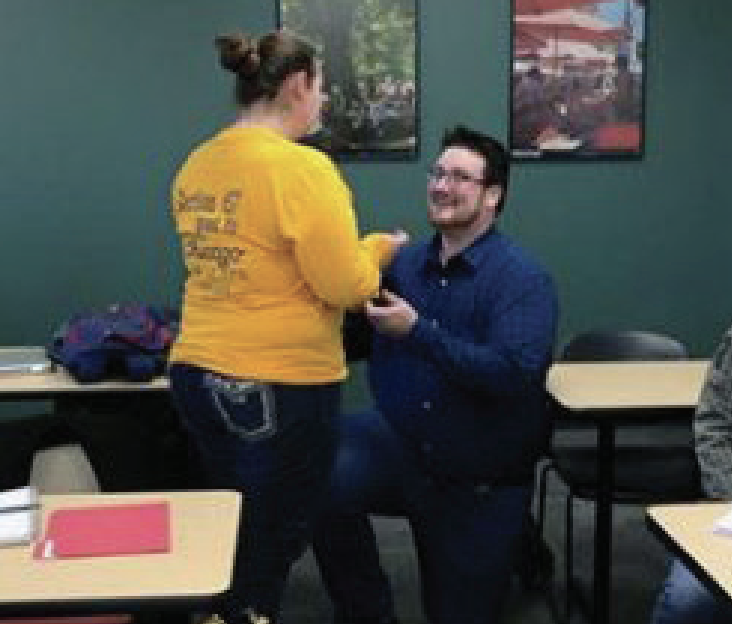
Katherine Herbort and Sam Ivers
Met one another at NKU in 2014. Both were German minors who had taken classes with Dr. Andrea Fieler. After Sam graduated, he proposed to Katherine in Dr. Fieler’s German 402 class in February 2015. You can read the whole story of how they met and the adorable details of their engagement here: https://inside.nku.edu/nkumagazine/2015/february/proposal.html
Six years later, we decided to follow up with the Iver’s and learned that they recently welcomed their first born, Theodore Blaise, into the world on Sept.30, 2020. We are so very excited for them!
For this issue’s alumni spotlight, we also are featuring two of our Spanish graduates who now work in the health care field as nurses.
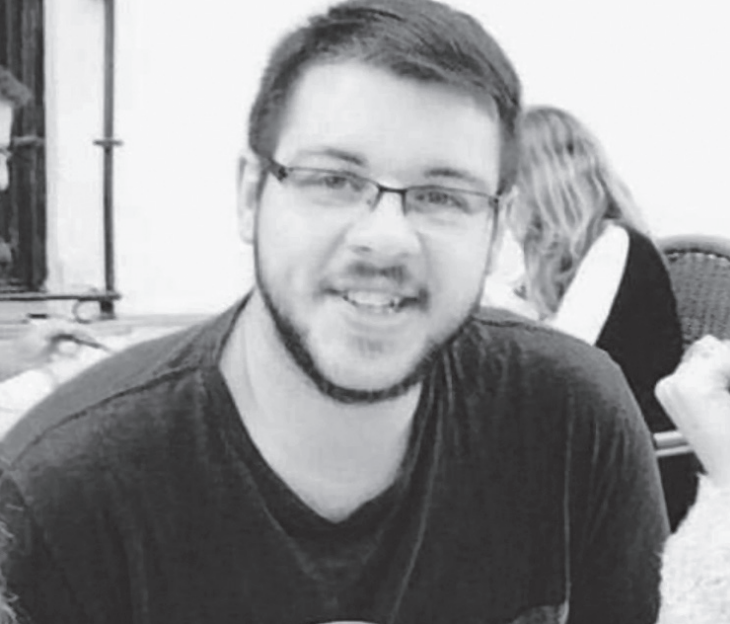
Jonathan Northcutt
Emergency Room Registered Nurse for St. Elizabeth in Florence, Kentucky B.A. Spanish/Psychology minor (‘11) B.S. Nursing (‘19)
Why did you choose to major or minor in a language?
“I chose to major in Spanish because it is such a practical language to know here in the U.S. It has given me the upper hand in gaining employment as a nurse and it allows me to better care for Spanish-speaking patients.
How do you apply your language skills and/or cultural knowledge in your professional and/or personal life?
“I work in Boone County where the Hispanic/ Latino population has grown exponentially over the last decade. The language skills that I acquired have allowed me to meet the needs of my Spanish-speaking patients and often set them at ease when they enter the emergency room and have someone that speaks their language. I am able to explain disease processes and truly make sure they understand the treatment they are receiving.”
Why do you believe that language study is important?
““it is important because it opens you up to a completely new perspective about the world. It enriches you as a person and makes you aware of peoples and lands outside of the United States.”
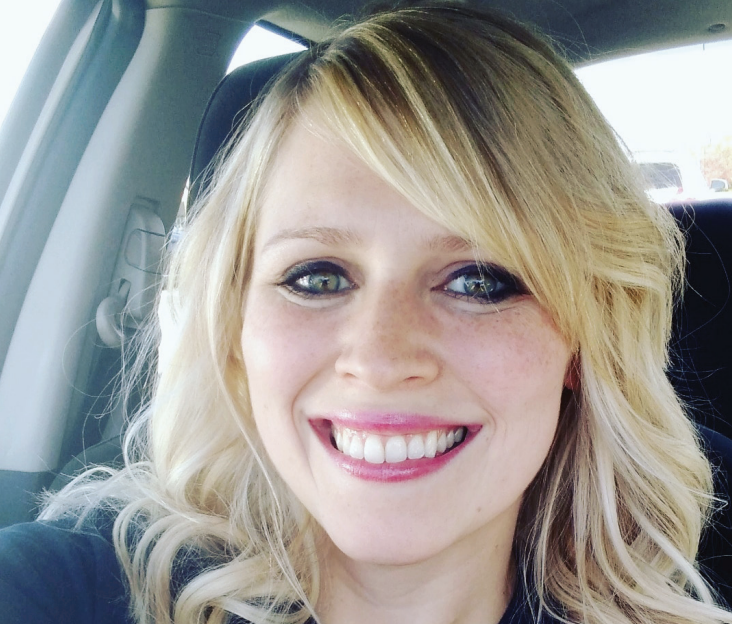
Megan Whittle
Travelling Labor and Delivery Registered Nurse B.A. Spanish/French minor (‘11) B.S. Nursing (‘13)
Why did you choose to major or minor in a language?
“I loved learning Spanish throughout school, and I wanted to travel and see what it’s like to live in different places.”
How do you apply your language skills and/or cultural knowledge in your professional and/or personal life?
“I am able to communicate with patients and other staff members who come to me when they cannot converse with a patient. Sometimes women come while in labor, and they cannot understand the questions the nurses ask. They cannot tell the nurse their medical history or some other vital piece of information. It is not always easy to get an interpreter in time, so it is very helpful to be able to communicate. It is a great feeling to know that you can help someone when others may not be able to.”
Why do you believe that language study is important?
“As a nurse, being able to communicate improves their care and outcomes. It is always nice to see patients and family members relax a little when they realize that you can understand them. Learning a language requires learning about cultures and anothers’ way of life. This teaches the learner that there is more than just one way to live. If we all took the time to learn this, the world would be a much better place.”
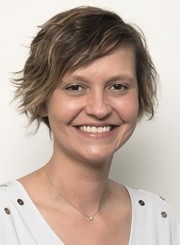
Dr. Fieler is a familiar face after teaching for us for more than 10 years. Last year, she was hired in the position of permanent lecturer of German in the Department of World Languages and Literatures. We wanted to give everyone the chance to get to know a little about the life of Dr. Fieler.
Where are you originally from?
I am originally from Konzen, a small village in the Eifel near Monschau and Aachen. It is about 35 km from Cologne and close to the Dreiländereck—a point where the borders of Germany, Belgium and the Netherlands run together. When I was 10 years old, we moved closer to Aachen, to Kelmis in Belgium. From 1998-1999, I lived in Hannover and worked as a goldsmith’s apprentice.
Where did you earn your undergraduate and graduate degrees, and what were your major(s) and minor(s)?
Between 1999-2001, I earned my undergraduate degree from the Rheinisch-Westfälische Technische Hochschule (RWTH) Aachen. At the RWTH, I completed my undergraduate studies in Neuere Deutsche Literaturgeschichte (German modern literary history), Deutsche Philologie (German philosophy) and Soziologie (sociology).
How long have you been working at NKU? What do you like about working at NKU?
After immigrating to the United States in 2001, I was a teaching assistant (TA) at the University of Cincinnati (UC). Being a TA at UC meant, however, that you plan and teach your own classes each semester while taking your graduate courses. At UC, I also taught German for the OLLI program, a program for people over 50 years old.
How long have you been teaching at NKU?
Since 2010, I have taught the following classes at NKU: Elementary German I, Intermediate German I and II, Business German (asynchronous), Introduction to German Translation (asynchronous), Jugendliteratur und Film (Independent Studies), Elder Scrolls Online: Morrowind auf Deutsch (Focus: Language acquisition, game studies, student philanthropy; Mayerson Project “Quest for Transitions”), Survey of German Literature, Studies in German Cinema (Focus: Survey of German film), German Composition and Conversation (Focus: Income inequality in Germany and the U.S. Mayerson Project), German Advanced Grammar: Repression, Resistance and Reflections (Focus: German and Spanish perceptions of the Holocaust, Mayerson Project), German Immigration (Focus: German immigration to the U.S. and specifically to the tri-state area with virtual reality component, Mayerson Project “Crayons to Computers”). You can view the Mayerson Project Fundraisers via Impact NKU here:
Quest for Transitions: https://impact.nku.edu/project/9509
Crayons to Computers: https://impact.nku.edu/project/1189
What do you like about working at NKU?
What I like the most about NKU are the many diverse people I get to work with. In the Department of World Languages and Literatures alone, we have nine different cultures represented. My students are equally diverse and come from all over the world. I relate deeply to my students, particularly, and many may not know this, because I was also a first-generation college student and understand our students’ struggles on a personal level.
What is an interesting fact about yourself that people might not know?
I have many hobbies: kayaking, fishing, motorcycle riding, archery, scuba diving, hiking, camping, running and Pilates. Did you know that Joseph Pilates was a German physical trainer who developed the Pilates method after immigrating to the United States in 1925 and opening a studio in New York City!
They are a great way for students to learn about potential career fields and build work-related skills while typically allowing students to gain academic credit, and in some instances, a paycheck. We spoke with several students in the World Languages and Literatures department who are currently completing internships this semester to find out how they are applying their language skills and cultural knowledge and how they feel they are benefiting from these experiences.
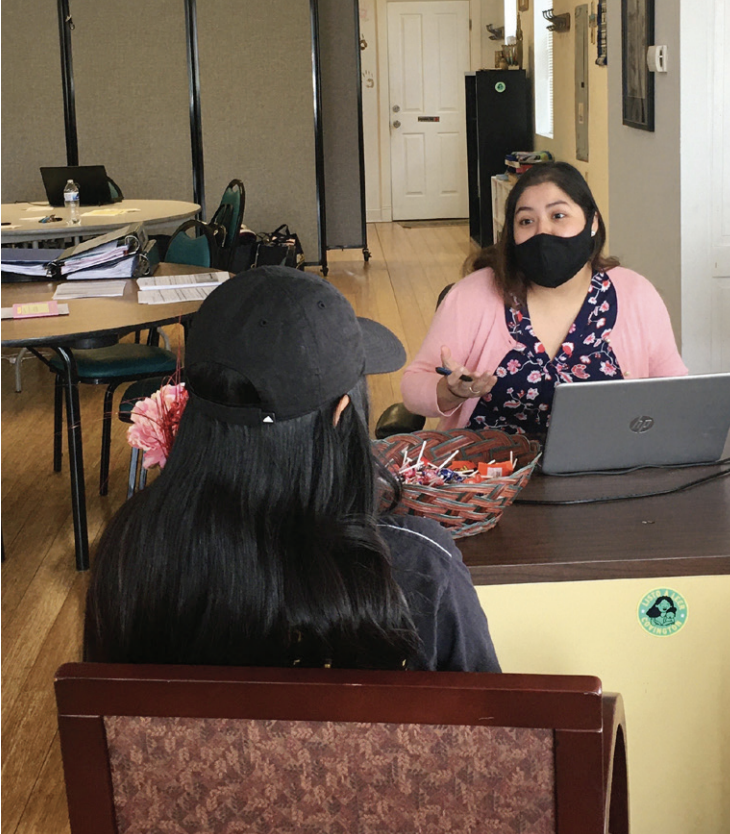
Jasmine Ibarra
Jasmine is a post-baccalaureate Spanish major who is currently completing an internship with the Esperanza Latino Center in Covington, Kentucky. The Esperanza Center offers key services created to serve the specific needs of the local Latino community. NKU’s own Leo Calderón and Spanish Professor Irene Encarnacion, who have a combined 50 years of experience serving the local Hispanic/Latino community, founded Esperanza in February 2019. Jasmine is completing this internship in person, while teaching online English as a Second Language (ESL) classes twice a week to a high school student. Her duties at the Esperanza Latino Center include answering phone calls, translating documents, greeting clients and connecting them to the desired services, and making outbound calls for surveys or registration. She also makes appointments for events with Be Concerned, a local nonprofit agency and free food pantry, who packs and distributes food to Latino families in need. Additionally, she helps with preparation, organization and execution of events sponsored by the center. Jasmine says that she uses skills acquired in her SPI 307: Introduction to Spanish Translation class that she took last semester when translating documents to find the best way to relay the message to the Spanish speaking community. She has learned that she has to be quick when translating from English to Spanish and vice versa when speaking and reading, like when she has to explain a document to a client. Jasmine believes that she will benefit from this experience by making connections with people in our community that serve the Hispanic/Latino population, and also by being exposed to other cultures other than her own and learning about other beliefs and ways of thinking.
Vanessa Dixon
Vanessa is an integrative studies major with minors in business administration, Latin American and Caribbean Studies and a Spanish focus. She is completing a virtual internship with the Kentucky Center for Mathematics (KCM), where she has been translating math games and instructions from a book called “Math Fact Fluency.“ These resources are widely available to students and teachers in elementary schools throughout the country, Vanessa says. “Having the games translated into Spanish ensures that these can be utilized by the Hispanic population who don’t speak English yet, giving students the opportunity to continue improving their math skills while they play.” The KCM vision in the project focuses on equality and it is a pleasure and honor to participate in such an important project. Despite having the advantage of being a Spanish native speaker, translating math games has its difficulties. One important aspect is ensuring that the specific math vocabulary is 100 percent accurate but also easily recognized by any Hispanic. Spanish is the official language in more than 20 countries, and words vary by country. For example, there are 10 different ways of saying “pen”: “pluma” in Mexico, “esfero” in Colombia, “plumero” in the Caribbean, “bolígrafo” in Spain and Venezuela, etc. Which one could we use to make sure anyone can understand the meaning? Other words are not easy to translate from English to Spanish. Collaborating with other people on the project allows for new ideas and improvements to help make the final translation perfect. There is a special attention to detail required for both the accuracy of the translation and the editing of the images and format. The experience of translating these games for such a big organization and collaborating with others as part of a team has been an invaluable one and will give me the trust and practice required to tackle other projects. I have learned the process of effective translations, the time required and the editing skills needed.”
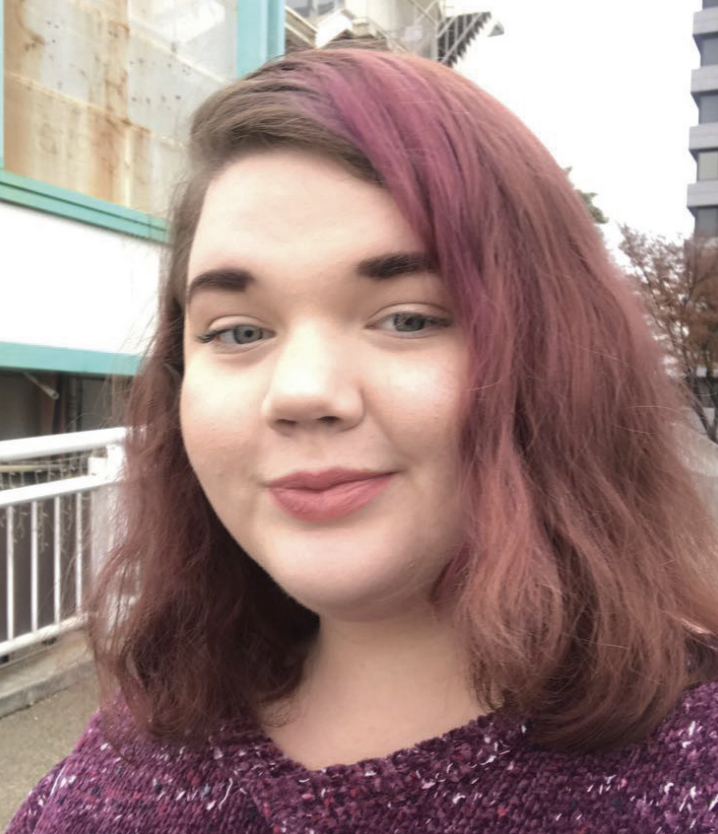
Valerie Handorf
“I’m majoring in Japanese, with minors in both Asian studies and English. I am currently doing a virtual internship with the Consulate General of Japan in Nashville. At my internship, I work with the social media coordinator and I get to find and share content about Japan and Japanese events in the United States while also being able to create my own original content about studying abroad in Japan and how there are similar aspects of Japanese culture here in Kentucky. As for language skills, I translate the captions for all the content that I share and/or create on the Consulate’s social media pages. I think that the main benefit of this internship is that it has allowed me to investigate the reach that Japanese culture has in the United States and to see that there are opportunities to learn more and experience real Japanese culture without having to go too far. Additionally, this has helped me to broaden my thinking when looking for jobs after I graduate.”
Allison Vesgas
Allison is a political science major and French minor who is completing a virtual Internship with the Kentucky courts. She is required to observe court sessions for several hours during the week. She is responsible for understanding all of the legal terms used in sessions in both English and Spanish. She must practice all types of interpretation styles. “I can use my Spanish throughout the entire internship, which helps me become more comfortable using the language. I have been able to use my cultural knowledge to understand formal settings and understand when professional/formal terms should be used. In court especially, it is important to address others in a formal manner and I must remember this each time,”Allison says. She believes that this internship is allowing her to broaden her horizons. As a political science major who intends on going to law school, having this experience has allowed her to explore another side of the criminal justice system.
To learn more about the importance of internships and how to find out more about these types of opportunities, visit:
https://inside.nku.edu/careerservices/students/coopinternships.html
HireNKU is a valuable online resource where you can find postings for available co-ops/ internships, information on career fairs and other events, and an employer directory.
We thought it would be a fun idea to feature recipes from areas of the world represented by the languages we teach in our department. This recipe comes from Japanese Professor, Dr. Junko Agnew. Try this recipe at home, and let us know what you think!
Quick and Tasty Salmon Flakes